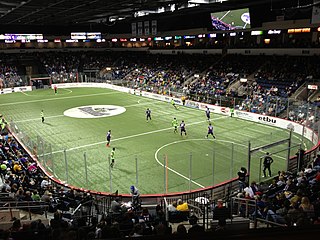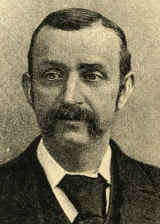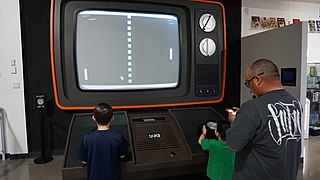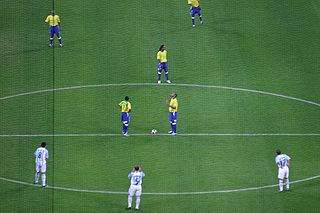
Field hockey is a team game of the hockey family. The earliest origins of the game date back to the Middle Ages in India. The game can be played on grass, water turf, artificial turf or synthetic field as well as an indoor board surface. Each team plays with eleven players, including the goalie. Players use sticks made out of wood, carbon fibre, fibre glass or a combination of carbon fibre and fibre glass in different quantities to hit a round, hard, plastic ball. The length of the stick is based on the player's individual height. Only one face of the stick is allowed to be used. Goalies often have a different kind of stick, however they can also use an ordinary field hockey stick. The specific goal-keeping sticks have another curve at the end of the stick, this is to give them more surface area to save the ball. The uniform consists of shin guards, shoes, shorts, a mouth guard and a jersey. Today, the game is played globally, mainly in parts of Western Europe, South Asia, Southern Africa, Australia, New Zealand, Argentina, and parts of the United States. Known simply as "hockey" in many territories, the term "field hockey" is used primarily in Canada and the United States where ice hockey is more popular. In Sweden, the term "landhockey" is used and to some degree also in Norway where it is governed by Norway's Bandy Association.

The 1994 FIFA World Cup was the 15th FIFA World Cup, held in nine cities across the United States, from 17 June to 17 July 1994. The United States was chosen as the host by FIFA on 4 July 1988. Despite the host nation's lack of soccer tradition, the tournament was the most financially successful in World Cup history; aided by the high-capacity stadiums in the United States, it broke the World Cup average attendance record with more than 69,000 spectators per game, a mark that still stands. The total attendance of nearly 3.6 million for the final tournament remains the highest in World Cup history, despite the expansion of the competition from 24 to 32 teams, which was first introduced at the 1998 World Cup and is the current format.

Indoor soccer or arena soccer, is a game derived from association football adapted for play in a walled indoor arena. Indoor soccer, as it is most often known in the United States and Canada, was originally developed in these two countries as a way to play soccer during the winter months, when snow would make outdoor play difficult. In those countries, gymnasiums are adapted for indoor soccer play. In other countries the game is played in either indoor or outdoor arenas surrounded by walls, and is referred to by different names.
Overtime or extra time is an additional period of play specified under the rules of a sport to bring a game to a decision and avoid declaring the match a tie or draw where the scores are the same. In some sports, this extra period is played only if the game is required to have a clear winner, as in single-elimination tournaments where only one team or players can advance to the next round or win the tournament. In other sports, particularly those prominently played in North America where ties are generally disfavored, some form of overtime is employed for all games.

Beach Soccer, also known as beach football, sand football or beasal, is a variant of association football played on a beach or some form of sand.

Super Mario Strikers, known as Mario Smash Football in Europe and Australia, is a five-on-five football (soccer) game developed by Next Level Games for the GameCube. The game was released in Europe and North America in late 2005, and in Japan and Australia in 2006. The game's sequel, Mario Strikers Charged, was also developed by Next Level Games and is available for the Wii. The game's developers had worked on NHL Hitz Pro before development of Strikers, which served as an influence for the fast-paced and physical nature of the game.
Super Sidekicks is a series of soccer video games made by SNK for its console, the Neo-Geo.

FIFA 97 is a video game developed by EA Canada and published by Electronic Arts based on the game of football (soccer). It was released for the PC on June 24, 1996 and versions for PlayStation, SNES, Mega Drive and Sega Saturn followed.

Mega Man Soccer is a soccer video game for the Super Nintendo Entertainment System. The game is based on the original Mega Man series of action-platform games. Mega Man Soccer was released in Japan on February 17, 1994 and in North America in April of that same year.

Tecmo Cup Football Game is a cancelled 1993 video game. While the game was about to be published by Sega with license from Tecmo for the Mega Drive/Genesis, it was cancelled due to the release department of Sega Europe's policy regarding third party games. The game would have enjoyed a Europe-exclusive release because the game was heavily promoted on many magazines and promo videos at the time. 'SuperJuegos' magazine from Spain even had a VHS promotion video including footage of the game and promoting its further release. There is a ROM of this game available on the Internet despite not having been released in cartridge form.

In the sport of association football, fouls and misconduct are acts committed by players which are deemed by the referee to be unfair and are subsequently penalized. An offense may be a foul, misconduct or both depending on the nature of the offence and the circumstances in which it occurs. Fouls and misconduct are addressed in Law 12 of the Laws of the Game.

The 2002 FIFA World Cup Final was a football match that took place on 30 June 2002 at the International Stadium in Yokohama to determine the winner of the 2002 FIFA World Cup. The final was contested by Germany and Brazil. It was the first World Cup meeting between the two sides. Brazil won the match 2–0, winning a record fifth title. Ronaldo, who became the record World Cup goalscorer at the 2006 tournament, scored two of his fifteen World Cup goals in the second half of the match, leading Brazil to the title and winning the Golden Boot award. It also marked Brazilian captain Cafu's third consecutive appearance in a World Cup Final, a feat that has yet to be accomplished by any other player in the history of the tournament. Both teams had won their respective groups before advancing to the knockout stage, where Germany shut out all of their opponents to reach the final, while Brazil only allowed a single goal from England. Germany overcame United States and co-host South Korea, while Brazil knocked out England and Turkey.
The following is an alphabetical list of terms and jargon used in relation to Gaelic games. See also list of Irish county nicknames

International Superstar Soccer is a football video game developed by Konami for the Super Nintendo Entertainment System. It is known as the best soccer game available for any 16-bit systems, mostly due to its lifelike approach, innovative for the time, that showed diversified players in the same team, with an adult look and back numbers on their respective jerseys, corresponding to real-life players of the time.

Inazuma Eleven is a role-playing sports video game for the Nintendo DS developed and published by Level-5. It was released in Japan in August 2008, and was localized in English in 2011. The game was also included in an compilation for the Nintendo 3DS, Inazuma Eleven 1-2-3: Endo Mamoru's Legend, which released in Japan in December 2012.

A comparison of Gaelic football and rugby union is possible because of certain similarities between the codes, as well as the numerous dissimilarities.

Goal Storm is a football video game developed by Konami Computer Entertainment Tokyo. It was released for the Sony PlayStation game console in 1995 in North America and in 1996 in other regions. The cover is the same with J-League Jikkyou Winning Eleven, with different colours.

The rules of water polo are the rules and regulations which cover the play, procedure, equipment and officiating of water polo. These rules are similar throughout the world, although slight variations to the rules do occur regionally and depending on the governing body. Governing bodies of water polo include FINA, the international governing organisation for the rules; the NCAA rules, which govern the rules for collegiate matches in the United States; the NFHS rules which govern the rules in high schools in the USA and the IOC rules which govern the rules at Olympic events.

Rugby World Cup '95 is a video game developed by Electronic Arts UK and published by Electronic Arts for the Sega Genesis and DOS.
























